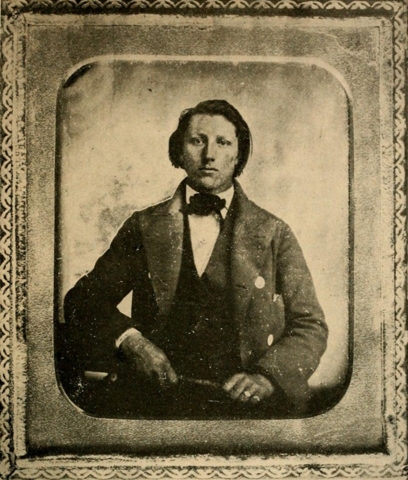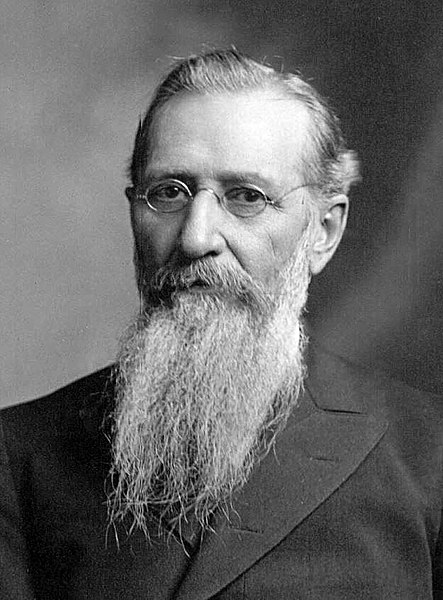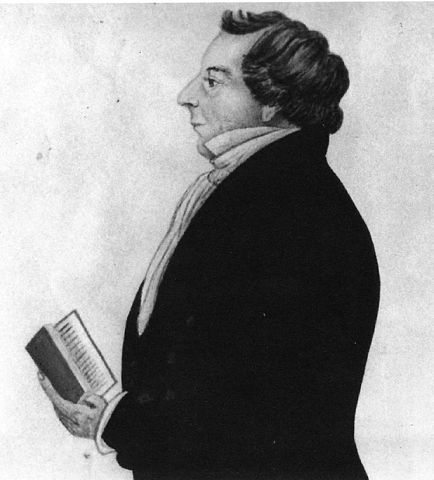In 1864, the Church of Jesus Christ of Latter-day Saints had a serious problem in the Sandwich Islands, what today we call Hawaii. The head of the church’s mission there had abused his stewardship and needed to be replaced. Elders Lorenzo Snow and Ezra T. Benson of the Quorum of the Twelve were dispatched to set things in order. To assist them in this endeavor, they recruited a young man who had just returned from a three-year mission in England and who had previously served a mission in Hawaii, where he learned the language and became well acquainted with the islands and their inhabitants.
After a long voyage, the party’s ship lay anchored in a channel at their destination. The seas in this region were rough, and traversing them could be dangerous unless you had the right kind of boat, were familiar with the currents, and knew the location of a man-made breakwater. Our young missionary possessed this knowledge, which he shared with his companions, recommending that they enlist the help of the locals and their specially designed boats to get ashore. But Elders Snow and Benson would have none of this.
They were impatient to get ashore and believed the young man’s concerns were exaggerated. So they insisted they take the ship’s freight boat and disembark immediately instead of waiting for the local natives to arrive in their smaller craft. The young missionary, however, was reluctant to join them, knowing that piloting the freight boat in these waters would be extremely dangerous. The brethren, however, ignored his advice and proceeded to chide him for his waywardness: “Young man, you would better obey counsel.”
Put yourself in the position of this returned missionary. You are devout member of the Church, you have a strong testimony, and you have served two missions abroad. Now you find yourself surrounded by two apostles and several others who are asking you—no, they are telling you in their capacity as your ecclesiastical superiors—to do something you believe is reckless. What would you do?
Our young missionary said no. He stayed behind and watched with great apprehension as everyone departed, except him. When the party reached the breakwater in the channel, he saw a great wave suddenly overturn the freight boat, dropping the entire company in 30 feet of water. The natives on shore witnessed this disaster and quickly provided assistance, but when they pulled Elder Snow from the water he was completely lifeless and presumed dead. Only by the grace of God were the prayers of those present answered and Lorenzo Snow brought back to life.
Curiously, these brethren later fatefully said of the incident that it “was meant to be.” But our young missionary stood his ground, saying, “prevention in this case would have been much better than the cure.”[1]
His “impudence” notwithstanding, the Lord apparently saw something in him. Shortly after his return to Utah, he was ordained an apostle and later served as counselor in the First Presidency of Young’s three immediate successors. Then, in 1901, he, Joseph F. Smith, became the sixth President of the Church.

Joseph F. Smith, age 19. Published in the Juvenile Instructor, Vol. 59, No. 4, April 1924, p. 169 
Joseph F. Smith, First Presidency, 1905 (photograph by Charles Roscoe Savage, 1832-1909)
About ten years ago, I shared this story in a talk I gave on the subject of agency. Word of this found its way to the stake president who instructed my bishop to tell me that unflattering episodes in the lives of past or present church leaders are not appropriate for discussion in church. My bishop dutifully delivered this message and proceeded to tell me that if he had been Joseph F. Smith, he would have gotten in the boat. In support of his position, he referenced D&C 1:38 (“…whether by mine own voice, or…). This prompted me to take a closer look at that oft-cited passage.[2]
I began by examining the scripture in context, reading all of verse 38, not just the most-frequently quoted part, and then giving careful attention to the verses that precede it:
Search these commandments, for they are true and faithful, and the prophecies and promises which are in them shall all be fulfilled. What I the Lord have spoken, I have spoken, and I excuse not myself; and though the heavens and the earth pass away, my word shall not pass away, but shall all be fulfilled, whether by mine own voice or by the voice of my servants, it is the same.
D&C 1:38
The italicized phrase is often cited for the proposition that anything said by a servant of the Lord (read: church leader) “is the same” as what the Lord would say. But when read in its entirety, this verse, and those that come before, say something different.
The emphasis in verse 38, as noted by LDS scholar Julie Smith, is solely on what the Lord has spoken, on the eternal nature of his utterances. He is telling us that what he has spoken will come to pass, whether it is stated by him or repeated by his servants. This scripture says nothing about whether everything a servant of the Lord says is the same as what the Lord would say. The focus here is not the reliability of the Lord’s servants; rather, it’s about the fulfillment of the Lord’s words, which will be realized whether they come directly from him or through one of his emissaries.[3]
Christ does have something to say about his servants in verses 24-28. He tells us they are weak and have erred and sinned, so he has given them commandments that they might repent and that, if they seek wisdom, they might be instructed. Also, note the use of the word “servants.” The text makes it clear this term is not a synonym for apostles and prophets, and also suggests that the term applies to anyone who aspires to be one.[4]
There are times, of course, when the Savior gives instruction to his servants for them to share with others. But he does so “after the manner of their language,”[5] which is imperfect. He has condescended to communicate his will to us, his children, in a manner he hopes we will understand, making allowances for our limited capacity to comprehend his thoughts.[6] Joseph Smith fully grasped the difficulty and frustration of communicating the revelations he received through finite, human language. “Oh Lord God deliver us in thy due time from the little narrow prison, almost as [it] were total darkness, of paper, pen and ink and a crooked broken scattered and imperfect language.”[7]
The use of D&C 1:38 to imply prophetic inerrancy is not just wrong because it is misleading; it is bad because it perverts our understanding as to what a prophet is and does. The unrealistic expectations created by this misinterpretation will frequently trigger a faith crisis when the unquestioning believer discovers that prophets do make mistakes, sometimes serious ones. Joseph Smith understood this better than most and did his best to disabuse people of the notion that he was anything other than a fallible man.

In Nauvoo, the prophet would periodically go down to the docks, donning his worst attire, to meet new members as they disembarked. He would then ask them, without revealing his identity, their opinion of this man “Joseph Smith.” To those who expressed faith in the prophet, he told them upfront: “I [am] but a man, and they must not expect me to be perfect…but if they would bear with my infirmities and the infirmities of the brethren, I would likewise bear with their infirmities.”[8] To those who came with greater expectations and thought the prophet would smooth the path before them or never make a wrong turn, he had four words of advice: “turn back right now.”[9]
The authors of the New Testament likewise wanted us to understand that the Lord’s disciples sometimes err. Like us, they periodically discriminated against women and those of different nationalities. Often their biases and preconceptions prevented them from understanding Christ’s teachings. And on more than one occasion their faith faltered.
None of these human failings, of course, justifies ignoring the teachings of the prophets of old or their modern counterparts. Nevertheless, it is not possible to take their counsel seriously unless we engage, both spiritually and intellectually, with its content. This means we can neither reject their teachings out of hand nor accept them reflexively.
As President J. Reuben Clark candidly acknowledged “even the President of the Church, himself, may not always be ‘moved upon by the Holy Ghost,’ when he addresses the people.” Because we have the ability to perceive when a speaker is moved upon by the Holy Ghost, “this completely shifts the responsibility from them to us to determine when they so speak.”[10] Brigham Young understood this as well, expressing genuine fear that church members will “settle down in a state of blind self-security, trusting their eternal destiny in the hands of their leaders with a reckless confidence that in itself would thwart the purposes of God in their salvation….”[11]
Ascertaining the source, reliability and applicability of what we hear from church leaders, read in the scriptures, and perceive through prayer, is a constant challenge, one that demands we engage with those sources rigorously. Shallow study breeds shallow certainties, what Elder Holland calls “theological Twinkies.”[12] By contrast, the kind of serious study our leaders advise is far more rewarding—but it is not easy.
For it to begin, we must realize that what we have passively accepted over the years through tradition is insufficient. Next, as President Hugh B. Brown taught, “some unlearning” will be required,[13] followed by, in the words of Elder Marion D. Hanks, “self-investment and effort.”[14] This process will, at times, yield more questions than answers, spawn differences of opinion, and perhaps cause frustration when we come upon paradoxes that seem to have no solution or inconsistencies we cannot reconcile. But the alternative—outsourcing our moral authority—is simply not a viable option.
[1] Joseph F. Smith, Gospel Doctrine: Selections from the Sermons and Writings of Joseph F. Smith, (Salt Lake City, Utah: Deseret Book Company, Inc., 1939), pp. 534-535.
[2] It also prompted me to decline all future speaking and teaching assignments in that ward.
[3] Julie M. Smith, “A Closer Look at D&C 1:38,” Times and Seasons (blog), March 10, 2016.
[4] D&C 1:14, 20.
[5] D&C 1:24.
[6] Isaiah 55:8-9 (“My thoughts are not your thoughts…)”
[7] Matthew C. Godfrey, Mark Ashurst-McGee, Grant Underwood, Robert J. Woodford, William G. Hartley, eds., The Joseph Smith Papers: Documents, Volume 2: July 1831-January 1833, (Salt Lake, City Utah, Church Historians Press, 2013) p. 320.
[8] Joseph Fielding Smith, compiler, Teachings of the Prophet Joseph Smith, (Deseret Book Company: Salt Lake City, Utah, 1977), p. 268.
[9] Truman G. Madsen, Joseph Smith the Prophet, (Salt Lake City, Utah: Bookcraft, Inc., 1989); Truman G. Madsen, “Joseph Smith Lecture 2: Joseph’s Personality and Character,” BYU Devotional, August 22, 1978.
[10] J. Reuben Clark, Jr., “When Are Church Leaders’ Words Entitled to the Claim of Scripture?” Delivered Wednesday, July 7, 1954 before the Summer Session of Seminary and Institute Teachers at the Brigham Young University. Reprinted in the Deseret News, Church News Section, July 31, 1954 (emphasis added).
[11] Brigham Young, Journal of Discourses, vol. 9, p. 150 (1862).
[12] Jeffrey R. Holland, “A Teacher Come from God,” LDS General Conference, April 1998, printed in the Ensign, May 1998, pp. 26-27.
[13] Hugh B. Brown, “An Eternal Quest,” BYU Devotional, May 13, 1969.
[14] Marion D. Hanks, “Theological Illiterates,” Improvement Era, September 1969, p. 42.

I had never heard this story, and I marvel at the bravery of the young Joseph F. Smith. That must have been difficult. It’s a testimony that we are all entitled to revelation on our own behalf, which is truly a magnificent gift.
I love history and really enjoyed learning about this part of church history. Thank you for sharing Eric.
Karen, this story appears in a book first published in 1919 by the Committee on Courses of Study for the Priesthood. It is over 500 pages in length and contains many of Joseph F. Smith’s sermons, correspondence and other writings. But the account of this story was not written by him; rather, it is featured in a biographical sketch at the end of the book composed by one or more members of the Committee.
This story, according to the author(s), reveals two dominant traits about Smith’s character: “When he is convinced of the truth, he is not afraid to express himself in its favor to any man on earth. When he does express himself, it is often with such earnestness and vigor that there is danger of his giving offense.” So, I’m not sure it was that difficult for him to stand up to these two apostles, though it is quite remarkable to find these character traits so well developed in someone so young.
Every person of faith, at some point in their lives, will have to decide whether their first loyalty is to an ecclesiastical institution/figure or to the truth, as best as they are able to discern it. The choice made by Joseph F. Smith is clear. He is one of my heroes.
Glad you enjoyed it, Shireen. Most members, I have found, are not familiar with this episode from the life of Joseph F. Smith. And given my experience in sharing it in church, I can understand why.
Fascinating story and experience. I am sad that we are discouraged on so many levels from analyzing and learning from past mistakes of both leaders and religious institutions—especially given how quick we can be to condemn other religions (both implicitly and explicitly) and those we deem “wicked.”
I think the oft repeated story of the lost manuscript is a rare exception albeit mischaracterized. Instead of focusing on the loss of the manuscript and the importance of obedience, I have found much more meaning in the knowledge that allowances have been made for the benefit of our learning from our mistakes. What was in the manuscript was clearly not as important to god as the lesson to be learned by letting them go.
Anyway, thank you for sharing your knowledge and insight. It is encouraging to know there are those among our ranks, like Joseph F Smith and yourself, who grasp the sacred and eternal nature of personal discovery and revelation, and empower others to do the same.
(On a side note, the discrimination of women and others is anything but periodic. Considering that Blacks were restricted from priesthood and temple ordinances from Brigham Young to Kimball, women’s healing blessings of faith have been disparaged and disciplined for the latter half of our history despite being common and acceptable during the first half, and the discipline facing LGBTQIA+ members for daring to love and live true to themselves presents nothing short of a legacy of cultural biases and beliefs sanctioned by the common misunderstanding of D&C 1:38 that you have deftly debunked here.)
Well, said, Nichole. When I composed this essay, I was tempted to include the “lost 116 pages” story you mentioned. It is noteworthy, I believe, for the reason you mentioned and because of Joseph’s genuine contrition. He didn’t try to duck responsibility by saying to the Lord, “Well, you told me I could let Martin show the manuscript to his wife.” He took ownership of his mistake and was prepared to live with the consequences, something his successors have struggled with.
One of my favorite posts yet! It puts into context what I have long believed and leads me to understand why the Lord deals with us the way he does. He is the same Yesterday, Today, and Tomorrow but we, with finite minds and languages, are unable to begin to understand and interpret many of the wonders that he has chooses to share with us. But what a wonderful opportunity we each have to study, ponder, and pray in order to deepen and enlarge our personal understanding. The potential for expansion of our perceptions is huge and exciting. We just have to be careful to not muddy the water with the words and ideas of man to the point we cannot see the beauty of what the Lord will have us learn.